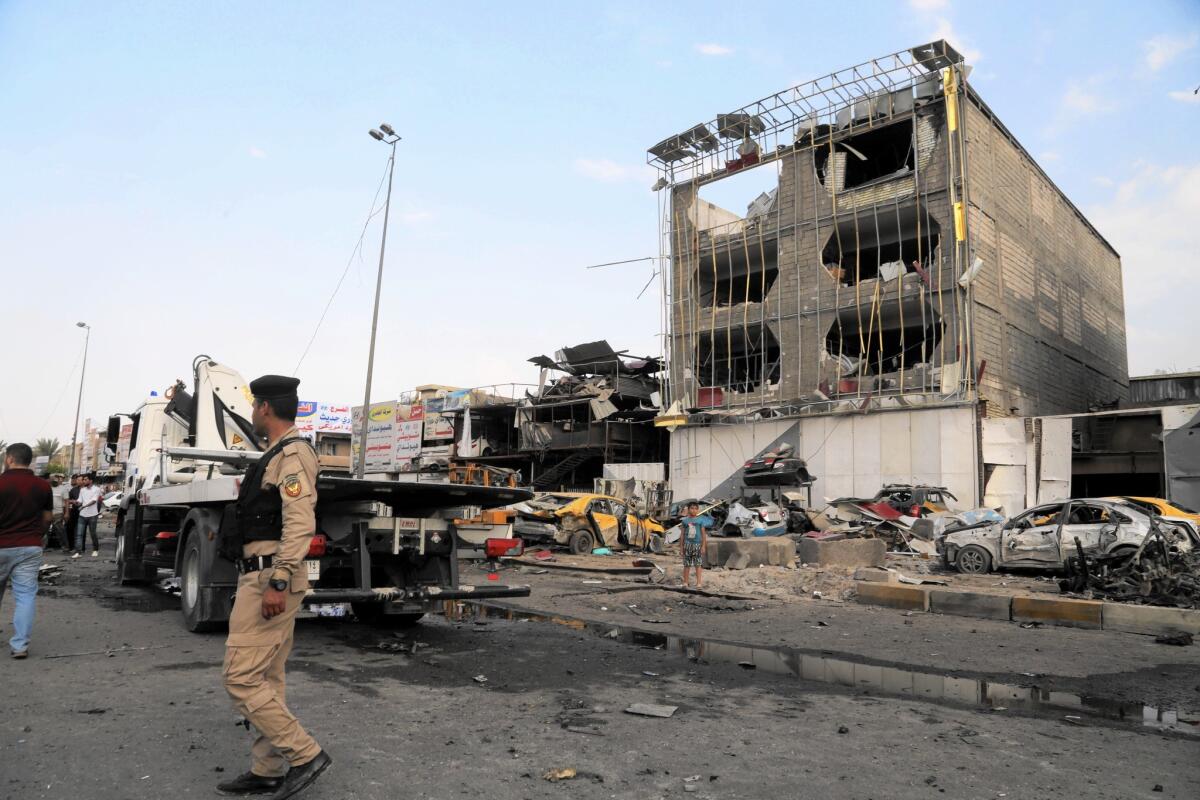Islamic State steps up bombings in Baghdad

- Share via
Reporting from Baghdad — While an international military effort has focused on Islamic State advances in northern Syria and in Anbar province in western Iraq, the extremists have stepped up their terrorist attacks in the Iraqi capital.
A series of car bombings struck Baghdad’s predominantly Shiite Muslim neighborhoods Thursday afternoon, killing more than 40 people and wounding nearly 100 in the latest of several attacks attributed to Islamic State. Multiple car bombings have occurred in the city almost every day this week as the Sunni militant group has targeted Shiite civilians and Iraqi police checkpoints.
U.S. and Iraqi military officials say the capital is secure from an advance by Islamic State fighters. But the wave of attacks threatens to undermine confidence in the month-old government of Prime Minister Haider Abadi, a moderate Shiite who has made overtures to the country’s Sunni Arab minority.
Baghdad remains outwardly calm, with vegetable markets and retail businesses crammed with customers amid the city’s usual traffic snarls. But the persistent thud of car bombs this month and in late September after a relatively quiet summer is a reminder of how close Islamic State fighters are to the capital. The extremists have seized about a third of the country this year.
Islamic State is locked in battle with Iraqi security forces, Shiite militias and Sunni tribesman just west of Baghdad in the district of Abu Ghraib. Parts of the district are only about 15 miles from the edge of Baghdad International Airport, which U.S. and Iraqi officials have vowed to keep open in the face of any Islamic State advance.
The militants claimed responsibility for two car bombings Thursday, saying they were aimed at Iraqi security forces and Shiite militias. The group has said it carried out previous car bombings in Shiite neighborhoods. Islamic State considers Shiites apostates and have slaughtered Shiite civilians and soldiers in its march through northern and western Iraq.
Iraqi security forces and Shiite militia leaders have said militant “sleeper cells” are active throughout Baghdad and have carried out numerous car bombings, one of which killed a Shiite member of the parliament Wednesday.
Four mortar shells struck Oct. 1 in the capital’s fortified Green Zone, a diplomatic and government area where the U.S. Embassy and Iraqi government ministries are located, the Washington Post reported. An embassy spokesman declined to comment Thursday on the report, saying the embassy does not typically comment on security-related incidents.
Five mortar rounds exploded Thursday afternoon in the predominantly Shiite neighborhood of Shula, killing five people and wounding 21, Reuters news agency reported.
Since Aug. 8, the U.S. and partner nations have launched airstrikes against Islamic State positions in Iraq, though none have been in the immediate Baghdad area.
On Thursday, a suicide car bombing occurred next to an Iraqi security force checkpoint in a Shiite district of northeast Baghdad in midafternoon, according to Iraqi media reports. Two more car bombs exploded almost simultaneously in another Shiite area of the city. Another bombing occurred in a predominantly Shiite neighborhood in south Baghdad.
On Wednesday, a car bomb killed 15 people and wounded 40 in the capital.
According to the United Nations, 352 civilians were killed and 983 were wounded last month in acts of terrorism or violence in Baghdad.
At a military gathering Wednesday night, Abadi tried to reassure Iraqis.
“Baghdad is safe and the vicious terrorists can’t and will not reach it,” he said in a televised speech. “Our brave security forces have managed to secure Baghdad and its perimeter.”
Meanwhile, the Pentagon said U.S. warplanes launched 14 airstrikes on Islamic State fighters near the Syrian city of Kobani on Wednesday and Thursday, targeting militant compounds, sniper positions and fighting positions.
Militant positions in and around the contested city have drawn 90 airstrikes this month, including 53 in the last three days.
Several hundred Islamic State fighters have been killed in the bombings, according to Pentagon spokesman Rear Adm. John Kirby.
The escalation in airstrikes comes as the militants have seized buildings and moved equipment in a push to take over Kobani. That has created more targets for air attacks.
“One of the reasons why you’re seeing more strikes there is because there’s more ISIL there,” Kirby said, using one of the acronyms for Islamic State.
In addition, military commanders have directed more warplanes and drones toward Kobani because bad weather has hindered U.S. spy planes and reconnaissance drones from flying over central Iraq, where Islamic State forces also have advanced.
“Our fighter bomber aircraft are all-weather aircraft, but you’ve got to have good information,” Kirby said. “That means you’ve got to have good support from an intelligence, reconnaissance, surveillance perspective, and that is heavily affected by bad weather.”
Kirby said the risk of civilian casualties in Kobani was diminishing because most of the population had evacuated. Several hundred residents remain, however.
Kurdish militia fighters still hold most of Kobani, but U.S. officials have warned that the city is in danger of falling to Islamic State.
“We know they want it,” Kirby said. “And as I said, the more they want it, the more resources they apply to it, the more targets we have to hit.”
Times staff writer W.J. Hennigan in Washington contributed to this report.
More to Read
Sign up for Essential California
The most important California stories and recommendations in your inbox every morning.
You may occasionally receive promotional content from the Los Angeles Times.












